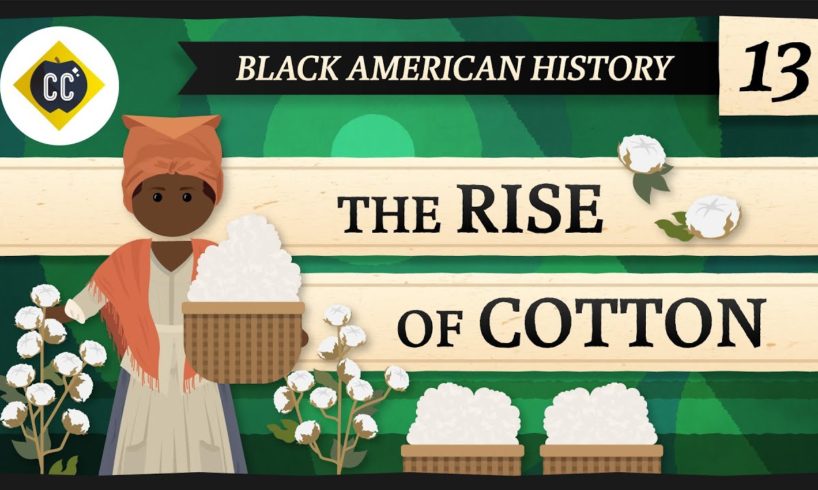
Cotton is everywhere in our modern world, and it became a hugely important crop in the 19th century United States. Cotton was a huge economic boon to the US, and much of that wealth was built on the backs of enslaved laborers. And cotton didn’t only benefit the states where slavery was legal. While cotton was mainly grown in the southern states, much of that cotton was processed in northern textile mills. Today we’ll learn about the growth of the cotton industry, who benefitted from it, and who was left out.
Clint’s book, How the Word is Passed is available now! https://bookshop.org/a/3859/9780316492935
VIDEO SOURCES
-Edward E. Baptist, The Half Has Never Been Told: Slavery and the Making of American Capitalism. New York: Basic Books, 2014.
-Sven Beckert, Empire of Cotton: A Global History. New York: Penguin Books, 2014.
-Eugene Dattel, Cotton and Race in the Making of America: The Human Costs of Economic Power. Lanham, MD: Ivan R Dee, 2009.
-Adam Rothman, Slave Country: American Expansion and the Origins of the Deep South. Cambridge: Harvard University Press, 2005.
-https://www.history.com/topics/inventions/cotton-gin-and-eli-whitney
Watch our videos and review your learning with the Crash Course App!
Download here for Apple Devices: https://apple.co/3d4eyZo
Download here for Android Devices: https://bit.ly/2SrDulJ
Crash Course is on Patreon! You can support us directly by signing up at http://www.patreon.com/crashcourse
Thanks to the following patrons for their generous monthly contributions that help keep Crash Course free for everyone forever:
Toni Miles, Oscar Pinto-Reyes, Erin Nicole, Steve Segreto, Michael M. Varughese, Kyle & Katherine Callahan, Laurel A Stevens, Evan Lawrence Henderson, Vincent, Michael Wang, Krystle Young, Michael Dowling, Alexis B, Rene Duedam, Burt Humburg, Aziz, DAVID MORTON HUDSON, Perry Joyce, Scott Harrison, Mark & Susan Billian, JJurong, Eric Zhu, Alan Bridgeman, Rachel Creager, Jennifer Smith, Matt Curls, Tim Kwist, Jonathan Zbikowski, Jennifer Killen, Sarah & Nathan Catchings, Brandon Westmoreland, team dorsey, Trevin Beattie, Divonne Holmes à Court, Eric Koslow, Jennifer Dineen, Indika Siriwardena, Khaled El Shalakany, Jason Rostoker, Shawn Arnold, Siobhán, Ken Penttinen, Nathan Taylor, William McGraw, Andrei Krishkevich, ThatAmericanClare, Rizwan Kassim, Sam Ferguson, Alex Hackman, Eric Prestemon, Jirat, Katie Dean, TheDaemonCatJr, Wai Jack Sin, Ian Dundore, Matthew, Justin, Jessica Wode, Mark, Caleb Weeks
__
Want to find Crash Course elsewhere on the internet?
Facebook – http://www.facebook.com/YouTubeCrashCourse
Twitter – http://www.twitter.com/TheCrashCourse
Tumblr – http://thecrashcourse.tumblr.com
Support Crash Course on Patreon: http://patreon.com/crashcourse
CC Kids: http://www.youtube.com/crashcoursekids
#crashcourse #history #blackhistory
source







Imagine how better off America would be if black Americans were allowed economic participation after reconstruction at least
The cotton gin extended slavery.:(
"It really doesn't get more clear than that"
+
Absolutely love this series!!! Keep up the great work
Damn, this really puts the past in perspective.
No wonder so many folks are against critical race theory, because this is unspeakably ugly and unfair history.
Please put this in our history books 🙏🏼
Well done episode & series. It's important to add that the rise of industrial capitalism in the 19th century, which was centered in the textile mills of England, could not have happened unless it was jump started by the imported American cotton that was so cheap because the labor costs for the enslaved people who produced it were so low. Two forms of exploiting labor – one even worse than the other – intersecting & reinforcing one another.
I am really appreciative of this deep dive into US history. Thanks so much!
I hope this series wil also include the tuskegee pilots
The launch of global capitalism was based on slavery and the “primitive accumulation of capital”
Great video series
Basically, black people in the USA, went from slavery to serfdom, after 1865.
Good video
It's incredible to know that this will be the first time some people watching this will have gotten the chance to learn these basic facts about our nation's history. It's a great first step.
4 Million human beings work were worth much more than all the machinery in the USA. It is almost like the workers hold the means of production and without them nothing can be build, cultivated, cooked or sold.
I can’t tell you how much I appreciate this series. Each week it gives me something to reflect on, and helps me to understand the world I live in. Such a wonderful resource.
There’s a great book “The Half has Never Been Told” that discusses the economics of slavery and wealth creation in America.
Awesome, Sir, more please..
Whenever I talk with anyone who says "Democrats are to blame for slavery" and I feel I have to explain (gestures broadly) all of 17th to 20th century history basically back to them… its exhausting. Hopefully just sending them this video will help. Thank you for this series!!!
Brilliant and chilling in it's delivery and content.
I watch this from South Carolina
This is an amazing series, thank you!!!
This series seriously kicks butt. I love it! Grateful for your dedication and commitment to this!
Great video. You are showing accurate history of America.
Amen, brother Clint.
As always, a well-crafted, informative series, presented by a stellar academic. Thank you for making this!
I am not American but found this very interesting
One quarter of all cotton in the world comes from Xinjiang where men and women are forced to work for low to no pay while their culture is being suppressed by the government
Why the dislikes? This stuff is good!
Basically, until about 1900, the United States was the "third world" country with sweatshops making stuff for rich people.
Thank you for bringing facts forward.
probably the best episode yet!
So grateful to you for making these ~ crash course videos , so informative and educational.
My boys actually like watching these. 🥰
Lotsa love from Winnipeg, Manitoba, Canada
Yes they didn't call Cotton king for nothing.
damn I wonder why this series gets the highest amount of dislikes?
First 😏
Thank you Clint. I'm grateful to learn more about this period of history. You're a great teacher.